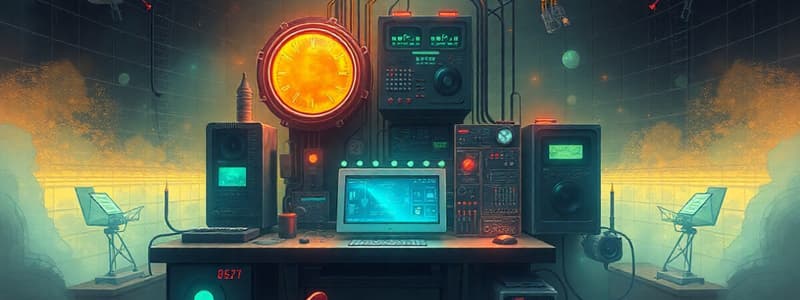Podcast
Questions and Answers
Who is known as the Father of Magnetism and Electricity?
Who is known as the Father of Magnetism and Electricity?
William Gilbert
What is the first device capable of storing electric charge?
What is the first device capable of storing electric charge?
Who invented the first vacuum tube?
Who invented the first vacuum tube?
John Ambrose Fleming
In what year was the transistor invented?
In what year was the transistor invented?
Signup and view all the answers
Which integrated circuit was developed at Texas Instruments and Fairchild Semiconductor?
Which integrated circuit was developed at Texas Instruments and Fairchild Semiconductor?
Signup and view all the answers
The digital revolution began in the 1980s with the rise of personal computers.
The digital revolution began in the 1980s with the rise of personal computers.
Signup and view all the answers
What revolutionized computing by combining multiple transistors on a single chip?
What revolutionized computing by combining multiple transistors on a single chip?
Signup and view all the answers
What is electronics?
What is electronics?
Signup and view all the answers
Who coined the term 'electricity'?
Who coined the term 'electricity'?
Signup and view all the answers
What is the Leyden jar?
What is the Leyden jar?
Signup and view all the answers
Who invented the first vacuum tube?
Who invented the first vacuum tube?
Signup and view all the answers
What did the first transistor revolutionize?
What did the first transistor revolutionize?
Signup and view all the answers
What did the integrated circuit combine?
What did the integrated circuit combine?
Signup and view all the answers
The Internet and Digital Age transformed global communication.
The Internet and Digital Age transformed global communication.
Signup and view all the answers
What revolution took place in the 1980s?
What revolution took place in the 1980s?
Signup and view all the answers
Who developed the first microprocessor?
Who developed the first microprocessor?
Signup and view all the answers
Study Notes
Brief History of Electronics
- Electronics is a branch of science that focuses on the study and application of electronic devices and circuits.
- Key figures in early electricity:
- Thales of Miletus (600 BCE) noted that rubbing amber with fur attracted objects, marking early observations of static electricity.
- William Gilbert (1600) coined the term "electricity" and differentiated between magnetism and electricity in "De Magnete."
Early Innovations
- The Leyden Jar (1745) was the first capacitor capable of storing electric charges, independently developed by Pieter van Musschenbroek and Ewald Georg von Kleist.
- John Ambrose Fleming invented the first vacuum tube, the diode, in 1904, which rectified AC to DC.
- Lee De Forest improved the vacuum tube by creating the triode in 1906, which amplified electrical signals.
Semiconductors and Digital Revolution
- The first transistor was invented in 1947 by John Bardeen, Walter Brattain, and William Shockley at Bell Laboratories, enabling amplification and switching of electronic signals.
- The integrated circuit (IC), developed by Jack Kilby and Robert Noyce, combined multiple transistors and components on a single chip, enhancing electronic device capabilities.
The Rise of Personal Computing
- The 1980s marked the rise of personal computers, making computing accessible to the general public, with companies like IBM, Apple, and Microsoft leading the industry.
- The Intel 4004, released in 1971, was the first microprocessor, centralizing processing tasks onto a single chip, revolutionizing computing.
Internet and Communication Advances
- The late 20th century saw the development of the internet and digital communication technologies, greatly transforming global communication and commerce.
Brief History of Electronics
- Electronics is a branch of science that focuses on the study and application of electronic devices and circuits.
- Key figures in early electricity:
- Thales of Miletus (600 BCE) noted that rubbing amber with fur attracted objects, marking early observations of static electricity.
- William Gilbert (1600) coined the term "electricity" and differentiated between magnetism and electricity in "De Magnete."
Early Innovations
- The Leyden Jar (1745) was the first capacitor capable of storing electric charges, independently developed by Pieter van Musschenbroek and Ewald Georg von Kleist.
- John Ambrose Fleming invented the first vacuum tube, the diode, in 1904, which rectified AC to DC.
- Lee De Forest improved the vacuum tube by creating the triode in 1906, which amplified electrical signals.
Semiconductors and Digital Revolution
- The first transistor was invented in 1947 by John Bardeen, Walter Brattain, and William Shockley at Bell Laboratories, enabling amplification and switching of electronic signals.
- The integrated circuit (IC), developed by Jack Kilby and Robert Noyce, combined multiple transistors and components on a single chip, enhancing electronic device capabilities.
The Rise of Personal Computing
- The 1980s marked the rise of personal computers, making computing accessible to the general public, with companies like IBM, Apple, and Microsoft leading the industry.
- The Intel 4004, released in 1971, was the first microprocessor, centralizing processing tasks onto a single chip, revolutionizing computing.
Internet and Communication Advances
- The late 20th century saw the development of the internet and digital communication technologies, greatly transforming global communication and commerce.
Studying That Suits You
Use AI to generate personalized quizzes and flashcards to suit your learning preferences.
Description
This quiz covers Lesson 1 of the Robotics curriculum, focusing on the brief history of electronics. Key figures like Musschenbroek and von Kleist are discussed, highlighting the development and application of electronic devices and circuits. Test your knowledge of the foundational concepts in electronics.




